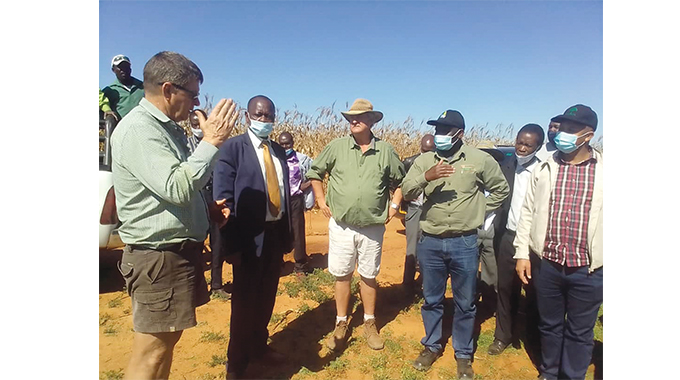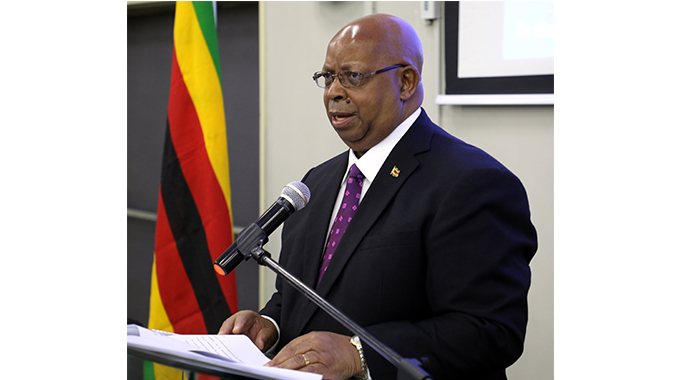Jobs and livelihoods at Insiza’s Artherstone Irrigation Scheme

Sukulwenkosi Dube-Matutu, Matabeleland South Bureau Chief
ARTHERSTONE Irrigation in Insiza District, Matabeleland South Province, which has been lying idle for the past 10 years, has become a major source of livelihood for the local communities and created jobs for 35 people.
The irrigation was recently revived by local farmers in partnership with an investor based in Cape Town, South Africa who mobilised resources and equipment. There is also a milling plant at the scheme.
Artherstone Irrigation Scheme, which produces maize, is also one of the large-scale producers of fodder in the province.
Farmers at the irrigation have just finished harvesting 35 tonnes of potatoes which were planted in May. They are in the process of harvesting onions, which has helped the local communities to access fresh farm produce all year round.
With 50 hectares of land under irrigation, farmers have opened up another 50 hectares where they intend to grow more cash crops.

Artherstone Irrigation Scheme farmer, Mr Zenzo Jele shows a lucerne field at their irrigation scheme
One of the farmers at the irrigation scheme, Mr Zenzo Jele said their target is to fully utilise the entire land productively.
“We are aiming high when it comes to production and utilisation of the land. Our wish is to feed the community and create as many jobs as possible. We want to be one of the main food producers in the province,” he said.
“We recently harvested 35 tonnes of potatoes, which are now available on the market. We have onions on 12 hectares of land which we are busy harvesting, and we are also preparing to plant maize.”
Mr Jele said they are targeting to introduce a variety of crops.
A villager from West Nicholson area, Mr Morris Dube, said they are now guaranteed of a constant supply of fresh farm produce at an affordable price.
Matabeleland South Provincial Affairs and Devolution Minister Abedinico Ncube commended farmers for boosting production and urged them to fully utilise available land.
“The thrust of Government under the Second Republic is to maximise production in irrigation schemes thereby contributing to the realisation of Vision 2030. The Government has put in place several measures and policies to boost investment in development of irrigation schemes,” he said.
“We are witnessing an increase in the number of irrigation schemes in the province being rehabilitated so that we maximise production and create more jobs.”
The minister said the efforts by farmers at Artherstone and other irrigation schemes are a reflection of commitment towards the country’s economic growth anchored on agriculture.

Minister of State for Matabeleland South Cde Abedinico Ncube (second from left) chats with farmers and investors from CapeZim Organisation and other stakeholders during a field day at Artherstone Irrigation Scheme in Insiza District recently
He said the latest development also dovetails with the National Development Strategy 1 (NDS1) which places particular emphasis on agricultural mechanisation and modernisation.
President Mnangagwa has been at the forefront of spearheading initiatives to improve productivity among smallholder farmers through improved access to agricultural inputs, technologies, finance and linking smallholder farmers with markets, as well as improving infrastructure and improving skills for better jobs across the agriculture value chain.

Potatoes and onions produced at Artherstone Irrigation Scheme
Zimbabwe’s agricultural systems struck the audience at the just-ended 12th Africa Green Revolution Forum (AGRF) in Kigali, Rwanda when President Mnangagwa shared Zimbabwe’s successful agricultural model.
AGRF is premier forum for driving the food and agriculture agenda on the continent, as vibrant and transforming.
The country’s agricultural revolution is drawing attention to various regional and international groups which are now keen to learn more from a nation which has gone for more than two decades under debilitating illegal sanctions and how it is transforming its food systems to become self-sufficient.
Minister Ncube said incapacitated farmers had to explore public private partnerships in order to fully utilise their allocated land.
Under the Second Republic, Government is prioritising the revival of the agricultural sector through the development of irrigation schemes to alleviate food insecurity and poverty particularly in rural communities.
A number of irrigations that had been lying idle in the province have been revived while some that were being underutilised have been capacitated and expanded. Investors through partnership with local farmers have also assisted with resources and equipment to enhance underutilised irrigations.
Government has also rolled out various agricultural schemes meant to transform subsistence agriculture at household level into commercial agriculture. Managers have been deployed managers to irrigation schemes across the country to maximise production thereby ensuring food security and nutrition. – @DubeMatutu











Comments